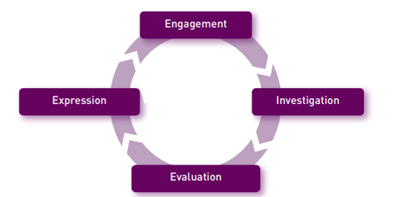Intent:
We use Discovery RE as the basis for our RE curriculum in school. This uses an enquiry approach which makes RE exciting and engaging for both teachers and children alike. Christianity is taught in every year group, with Christmas and Easter given fresh treatment every year, developing children’s learning in a progressive way. Buddhism, Hinduism, Islam, Judaism and Sikhism are included across children's time in school.
Our aim is support all children to develop an understanding of the place that religion plays in people’s lives.
We want our pupils to:
- Learn from different religions and beliefs
- Be free to make their own choices and decisions concerning religion and belief. RE does not try to persuade but rather to inform and develop the skills with which evaluation can take place.
- Share their knowledge and experience with others.
- Revisit the different religions to build on the knowledge they already have.
- Embrace diversity and create a learning journey that leaves lasting memories.
Implementation:
At Hardwick Green, RE is taught to all age groups mainly through weekly lessons to ensure we meet the expected time allocation and the curriculum coverage it needs to fully explore the subject.
We use the ‘Discovery RE’ Scheme as a main resource, which is supplemented with other resources to provide first hand experiences for the children.
The key question for the enquiry is such that it demands an answer that weighs up ‘evidence’ and reaches a conclusion based on this. This necessitates children using their subject knowledge and applying it to the enquiry question, rather than this knowledge being an end in itself. Discovery RE focuses on critical thinking skills, on personal reflection into the child’s own thoughts and feelings, on growing subject knowledge and nurturing spiritual development.
Each enquiry is split into four steps:

Step One: Engagement
The human experience underpinning the key question is explored here within the children’s own experience, whether that includes religion or not e.g. a human experience underpinning the question, ‘What is the best way for a Sikh to show commitment to God?’ is ‘commitment’, so lesson 1 aims to help all children resonate with the experience of ‘commitment’ in their own lives. If they can relate to this human experience they will be better able to understand the world of religion into which the enquiry takes them. Their personal resonance with this underpinning human experience acts as the bridge into the world of religion (which may be very much outside of their experience).
Step Two: Investigation
The teacher guides the children through the enquiry, children gaining subject knowledge carefully selected to assist their thinking about the key question.
Step Three: Evaluation
This lesson draws together the children’s learning and their conclusions about the key question of that enquiry. This is an assessment task which the teacher can assess by using the age-related expectation descriptors at the end of each enquiry.
Step Four: Expression
Children are taken back to Step 1, their own experience, to reflect on how this enquiry might have influenced their own starting points and beliefs. There is often further evidence for their books produced in this lesson. The whole learning experience of the class is gathered into a class Discovery RE Portfolio.
To enhance the learning of RE, we encourage learning about religious experiences, such as, visiting the local church, meeting religious speakers and handling real artefacts, learning through stories and drama where possible.
Impact
Our curriculum:
- Teaches pupils to have a better understanding of the religions that make up the UK landscape and how they can work from and alongside each other to create a cohesive community.
- Promotes inquisitive minds, respect, tolerance and understanding for all those around them including themselves.
- Enables high quality work to be produced and evidenced, showcasing a deep understanding of the main religions of the world, their community and their future.
- Creates evidence that will be seen through using the correct vocabulary, explanations and respectful opinions, as well as cross curricular evidence, for example, religious and cultural art work, drama, craft and presentations.
- Makes important contributions to other parts of the school curriculum such as citizenship, personal, social, health and economic education (PSHE education).
- Helps pupils create a life-long learning for exploring religious beliefs and understanding how it can help them in their future
- Develops pupils’ abilities to articulate and communicate ideas, options and feelings about their own religion and that of others.
- Develops essential skills such as self-confidence, collaboration, and self-reflection.
- Allows pupils to achieve well in R.E. which is reflected through a consistent learning journey and clear progress.
- Creates lasting memories from a range of religious experiences
The impact of our RE curriculum is constantly monitored through both formative and summative assessment opportunities. We use Enquire Learning Trust’s foundation subject assessment system, which shows pupils’ understanding in both substantive and disciplinary knowledge, and identifies next steps for learning and areas to be the focus of retrieval practice to ensure pupils know more and remember more in RE.